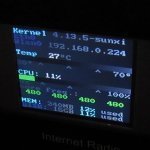Search the Community
Showing results for 'xradio'.
-
We are trying to install wifi driver for Xradio Xr-819 and also for D-Link Wifi Adapter in Mainline Image of Orange Pi PC. We have tried for xradio by https://www.cnx-software.com/2016/11/10/allwinner-h2-linux-android-sdk-and-allwinner-xr819-wifi-driver-released/ and https://github.com/fifteenhex/xradio. Also, we have tried by installing u-boot https://notsyncing.net/?p=blog&b=2016.orangepi-pc-custom-kernel. We have tried for D-Link by https://github.com/xk/rtl8812AU_rtl8821AU and http://www.philipzucker.com/getting-goddamn-wifi-on-the-goddamn-orange-pi-pc/. Also, we tried to made modifications in file /etc/network/interfaces but that file shows in Read Only Mode but nothing works out. Need help ASAP.
-
Thanks martinayotte, So I've reflashed my sdcard (fs was corrupted after to many reboot i think) I've disable xradio, lowered cpufreq to 600Mhz, installed ser2net and armbian monitor. Boot was succesfull with usb, soc temp is at 29°C (if sensor is accurate ) I just have to wait some days
-
Thanks chwe, I doesn't know but that useful. That's going to help me to save lot's of time. Is there a guide to disable xradio ?
-
My OPiZeroPlus2-H3 take about 9 sec to boot, because we are talking about Armbian image here, not some crappy image taken elsewhere ... OPiZero-H2 has a crappy XRadio WiFi, it sometimes can take longuer to get DHCP address than OPiZeroPlus2-H3 ...
-
Try blacklisting wireless (xradio) and set lower max CPU frequency (/etc/default/cpufrequtils). Some revisions of this board have overheating issues ... which are a possible cause for troubles. Where does it hang?
-
@Igor Is there a way to tell the difference between the beta (xradio works) and stable?
-
@fehernyul The Armbian mainline beta worked fine with wifi using 4.17 kernel. I'm not sure why the xradio stuff was stripped out of the stable release. If you do not have a mini shield then the only way to access the Duo is through the serial port (USB when plugged into PC powers Duo and allows serial access) or build your own Ethernet port. In any event the stable release is worthless for stand alone Duos which most of my usage scenarios require. I was lucky to have 3 mini shields, so I was able to get Ethernet working to play around with configuring wifi. For now I have been using the FriendlyElec image since xradio works fine, but I'd really like to use Armbian again.
-
Hi All, I have the very same issue with wifi here. I use Nanopi-duo without any additional board and I have no wifi. Currently I can connect to duo via my linux laptop with microusb data cable, nanopi-duo shows up as hanging on /dev/ttyACM3 serial port: sudo minicom -b 115200 -D /dev/ttyACM3 I have exactly the same output like you have for dmesg or "find / -name xradio*, lsmod etcetera. I cannot effectively connect to internet with the board ATM so armbian-config does not work here either. What bugs me I switched from friendlyelec's ubuntucore based linux, where wifi works out of the box! https://drive.google.com/drive/folders/1nRO655LaabJzM-OT7eE7fsPOEDM3PTVg I gave a try to armbian because friendlyelec distro runs with extreme cpu heat on nanopi-duo. Measuring 60-70 C degree, where I can barely touch the heatsink, playing with cpu-freq and governors does not helped. Well armbian runs quite surprisingly cooler, it is 20-25 C degree idle, I can touch the heatsink and it really feels slightly warm. Also under load (stress command) it ramp up a bit to max 50 C then after load ends it drops immediately to range 30 C degree for armbian. We need somehow merge both distro's solution (basically both are the same kernel version 4.14.x and based on ubuntu). Somehow check what friendlyelec distro incorporate that wifi (xradio_wlan) works there out of the box. Also check how armbian distro solved the cpu heat issue so nicely that it is just slightly warm when idling and cools immediately after high load.
-
@Igor I fixed this by using armbian-config, clearing interfaces and using /etc/network/interfaces. Now I can reboot with a static address. With NanoPi Duo I had to remove netplan and use ifupdown for eth0, but the xradio wifi stuff seems to be missing from the kernel (modules, etc.). But in essence they exhibited the same issue with eth0.
-
@martinayotte @Igor Both of those sections are in the dtb. I found vcc-wifi: disabling in dmesg, but no xradio stuff. The Duo with beta has xradio dmesg and more files, so it looks like files are missing in Stable release, not just DT problem. Beta: [ 13.746635] xradio_wlan mmc1:0001:1: no mac address provided, using random [ 14.100561] xradio_wlan mmc1:0001:1: missed interrupt [ 14.100717] xradio_wlan mmc1:0001:1: Input buffers: 30 x 1632 bytes [ 14.100724] xradio_wlan mmc1:0001:1: Firmware Label:XR_C01.08.0043 Jun 6 2016 20:41:04 Beta: sudo find / -name xradio* /sys/devices/platform/xradio_pm.0 /sys/bus/platform/devices/xradio_pm.0 /sys/bus/platform/drivers/xradio_pm /sys/bus/platform/drivers/xradio_pm/xradio_pm.0 /sys/bus/sdio/drivers/xradio_wlan /sys/module/mac80211/holders/xradio_wlan /sys/module/xradio_wlan /sys/module/cfg80211/holders/xradio_wlan /lib/modules/4.17.3-sunxi/kernel/drivers/net/wireless/xradio /lib/modules/4.17.3-sunxi/kernel/drivers/net/wireless/xradio/xradio_wlan.ko /proc/irq/104/xradio Stable: /lib/modules/4.14.65-sunxi/kernel/drivers/net/wireless/xradio /lib/modules/4.14.65-sunxi/kernel/drivers/net/wireless/xradio/xradio_wlan.ko
-
That was the first thing to check. Now next thing to check if the DT is correctly including the xradio node : under the "mmc@1c10000"node, you should have something like : sdio_wifi@1 { reg = <0x1>; compatible = "xradio,xr819"; interrupt-parent = <0xc>; interrupts = <0x6 0xa 0x1>; interrupt-names = "host-wake"; phandle = <0x37>; }; Check also the presence of "wifi_pwrseq" node : wifi_pwrseq { compatible = "mmc-pwrseq-simple"; reset-gpios = <0x2e 0x0 0x7 0x1>; post-power-on-delay-ms = <0xc8>; phandle = <0xf>; }; (Note : the above values are from my OPiZero board, so on your NanoPiDuo it could be a bit different...) Check "dmesg | grep mmc" to see if something went wrong during power up of the wifi. Do you see some with "dmesg | grep -i SDIO" ? Does "cat /proc/device-tree/soc/mmc@1c10000/status" reports "okay" ?
-
@martinayotte OK, I have static eth0 config working with the Mini Shield and no more dynamically creating adapters on reboot. I still have the original issue of no wifi device. I assume I need to get the XR819 device working. It used to work fine in beta Linux nanopiduo 4.17.3-sunxi #28 SMP Sat Jun 30 21:45:31 UTC 2018 armv7l armv7l armv7l GNU/Linux which has xradio_wlan. Seems to be missing from stable mainline release (only /lib/modules/4.14.65-sunxi/kernel/drivers/net/wireless/xradio/xradio_wlan.ko is present). uname -a Linux nanopiduo 4.14.65-sunxi #12 SMP Tue Aug 21 10:46:54 CEST 2018 armv7l armv7l armv7l GNU/Linux lsmod Module Size Used by lz4 16384 20 lz4_compress 53248 1 lz4 zram 24576 5 sun8i_codec_analog 24576 0 snd_soc_core 118784 1 sun8i_codec_analog snd_pcm_dmaengine 16384 1 snd_soc_core snd_pcm 65536 2 snd_pcm_dmaengine,snd_soc_core snd_timer 24576 1 snd_pcm snd 45056 3 snd_timer,snd_soc_core,snd_pcm soundcore 16384 1 snd sun4i_gpadc_iio 16384 0 uio_pdrv_genirq 16384 0 uio 16384 1 uio_pdrv_genirq sch_fq_codel 20480 2 usb_f_acm 16384 1 u_serial 20480 3 usb_f_acm g_serial 16384 0 libcomposite 40960 2 g_serial,usb_f_acm ip_tables 20480 0 x_tables 20480 1 ip_tables pwrseq_simple 16384 1 uas 20480 0 sudo lshw -C network *-network description: Ethernet interface physical id: 7 logical name: eth0 serial: ee:ee:ee:ee:ee:ee size: 100Mbit/s capacity: 100Mbit/s capabilities: ethernet physical tp aui bnc mii fibre 10bt 10bt-fd 100bt 100bt-fd autonegotiation configuration: autonegotiation=on broadcast=yes driver=st_mac100 driverversion=Jan_2016 duplex=full ip=192.168.1.69 link=yes multicast=yes port=MII speed=100Mbit/s nano /etc/network/interfaces auto eth0 iface eth0 inet static address 192.168.1.69 netmask 255.255.255.0 gateway 192.168.1.1 dns-nameservers 192.168.1.1 Remove netplan, etc. systemctl stop networkd-dispatcher systemctl disable networkd-dispatcher systemctl mask networkd-dispatcher apt-get purge nplan netplan.io
-
Just bumped this one: Orange Pi Zero, stable version, legacy kernel Trying to insert Realtek WiFi dongle (8188eu in my case). Module cannot load - with this error: Peeked solution on 4pda - http://4pda.ru/forum/lofiversion/index.php?t750921-1740.html - decompiled script bin and set wifi_usbc_id = 1 - before it was set to none. Original solution has value "2", but it was just a guess, so I used "1". Module worked in parallel with original xradio. According to original poster on 4pda, this issue was seen on Orange Pi PC. Not sure, is it correct solution, but, well - it may help. Issues seen - when I try to unload realtek module, then modprobe back with some other parameters for powersaving or mac changing wia rtw_xxx options - original xradio gets also resetted. Issue with wifi_usbc_id does not show up, if i use ralink 2800 dongle for example. Hope it is not a duplicate topic and may help others somehow.
-
Try to get armbian compiled for PineH64. Unfortunately, hitting this roadblock. drivers/net/wireless/xradio/sdio.c:17:10: fatal error: asm/mach-types.h: No such file or directory #include <asm/mach-types.h> ^~~~~~~~~~~~~~~~~~ compilation terminated. scripts/Makefile.build:312: recipe for target 'drivers/net/wireless/xradio/sdio.o' failed make[4]: *** [drivers/net/wireless/xradio/sdio.o] Error 1 scripts/Makefile.build:559: recipe for target 'drivers/net/wireless/xradio' failed make[3]: *** [drivers/net/wireless/xradio] Error 2 scripts/Makefile.build:559: recipe for target 'drivers/net/wireless' failed make[2]: *** [drivers/net/wireless] Error 2 scripts/Makefile.build:559: recipe for target 'drivers/net' failed make[1]: *** [drivers/net] Error 2 Makefile:1060: recipe for target 'drivers' failed make: *** [drivers] Error 2 [ error ] ERROR in function compile_kernel [ compilation.sh:337 ] [ error ] Kernel was not built [ @host ] [ o.k. ] Process terminated Any suggestions? Is this even needed - xradio. I will try to exclude it from the build. Thank you
-
There are only two versions of this driver as you already discovered. One is stock, from Allwinner and the other is a result of a desperate attempt to make it work on a modern kernel. I don't recall any other wireless driver that would waste community that much time. Do some search on the forum to get a picture: xradio, xr819, zero wireless, ... Rather pick 8811AU (or better), plug it into USB and forget that Opi Zero has a wireless chip.
-
This is what I get after excluding xradio driver from the build. CC drivers/of/configfs.o drivers/of/configfs.c: In function ‘create_overlay’: drivers/of/configfs.c:67:8: error: implicit declaration of function ‘of_overlay_create’; did you mean ‘of_overlay_remove’? [-Werror=implicit-function-declaration] err = of_overlay_create(overlay->overlay); ^~~~~~~~~~~~~~~~~ of_overlay_remove drivers/of/configfs.c: In function ‘cfs_overlay_release’: drivers/of/configfs.c:218:3: error: implicit declaration of function ‘of_overlay_destroy’; did you mean ‘of_overlay_remove’? [-Werror=implicit-function-declaration] of_overlay_destroy(overlay->ov_id); ^~~~~~~~~~~~~~~~~~ of_overlay_remove cc1: some warnings being treated as errors scripts/Makefile.build:312: recipe for target 'drivers/of/configfs.o' failed make[2]: *** [drivers/of/configfs.o] Error 1 scripts/Makefile.build:559: recipe for target 'drivers/of' failed make[1]: *** [drivers/of] Error 2 Makefile:1060: recipe for target 'drivers' failed make: *** [drivers] Error 2 [ error ] ERROR in function compile_kernel [ compilation.sh:337 ] [ error ] Kernel was not built [ @host ] [ o.k. ] Process terminated
-
Probably... But my background is chemistry, or to be a bit more precise I did scale up from small to big.. And things you think about there is: What happens when...? your wifi stuff ends in a locked kernel, kernel panic what ever.. the RT capabilities aren't that good as you though and some stuff which keeps the drone in an automatic flight mode doesn't work properly your FS is somehow corrupted and your SBC is for whatever reason not longer accessible during flight. To penetrate WiFi you have to flight over other peoples home (the legal aspect of your project is another field which I don't answer cause I've no idea what is okay and where it gets problematic) but I'm sure you get a bunch of problems when your drone hits somebody and the legal authorities figured out that this happened cause your drone was in an auto-flight mode with a setup which wasn't appropriate. Legal authorities are a bit picky about drones in those days, and you shouldn't gave them a reason that your drone project to make it harder for the 'good guys' developing fancy and nice stuff for drones. I would use the SBC on your drone only for collecting telemetric data not needed for a proper flight and your WiFi stuff you want achieve and stick to a flight control which is known that it works well. For sure a more conservative approach, but when it comes to fly over other peoples home safety should be adressed first over the other goals of the project. You wan't be one of this guys: https://www.theverge.com/2014/11/13/7205741/i-almost-killed-someone-with-a-drone In terms of performance (for the network penetrating stuff), I think a cheap H3/H5 board will perform similar or even better.. And if you buy one with a decent onboard wifi, you're able to connect external antennas so you might no need a second wifi attached to it. Maybe a BPi m2-zero? the built in wifi (AP6212) is for sure better than the Xradio stuff on OPi0 (the 'original' not OPi0plus etc. they change wifi chips quite often... ) or NanoPi Duo, but the board has no official Armbian support and needs some tweaks to get it boot... Whereas boards with a pmic developed for tablets (e.g. often on A64 boards populated) would make sense cause you'll power your board from battery (but I've no clue how good the software side for such boards is, and which board has a known working battery powered possibility).. btw. the 'new' small beagle (PocketBeagle):
-
Can you please help me to find the used Linux Version? This is the boot output via Serial. I need the Linux Version which is used. U-Boot SPL 2017.05-g64c4ffa (Oct 20 2017 - 15:30:13) DRAM: 256 MiB Trying to boot from MMC1 U-Boot 2017.05-g64c4ffa (Oct 20 2017 - 15:30:13 +0200) Allwinner Technology CPU: Allwinner H3 (SUN8I 1680) Model: Xunlong Orange Pi Zero DRAM: 256 MiB MMC: SUNXI SD/MMC: 0 In: serial Out: serial Err: serial Net: phy interface0 eth0: ethernet@1c30000 Hit any key to stop autoboot: 0 gpio: pin PA17 (gpio 17) value is 1 35424 bytes read in 128 ms (269.5 KiB/s) 4777536 bytes read in 745 ms (6.1 MiB/s) Starting kernel ... [sun8i_fixup]: From boot, get meminfo: Start: 0x40000000 Size: 256MB ion_carveout reserve: 160m@0 256m@0 130m@1 200m@1 ion_reserve_select: ion chipid [0x2c00042! ion_reserve_common: ion reserve: [0x47e00000, 0x50000000]! [ 0.000000] Booting Linux on physical CPU 0 [ 0.000000] Initializing cgroup subsys cpuset [ 0.000000] Initializing cgroup subsys cpu [ 0.000000] Linux version 3.4.113-sun8i (root@jenkins) (gcc version 4.8.4 (Ubuntu/Linaro 4.8.4-2ubuntu1~14.04.1) ) #24 SMP PREEMPT Fri Jul 21 13:20:01 CEST 2017 [ 0.000000] cma: dma_declare_contiguous(266): ION reserve size should be 4m align! adjust size to 128MBytes [ 0.000000] cma: CMA: reserved 128 MiB at 48000000 [ 0.000000] PERCPU: Embedded 8 pages/cpu @c0d18000 s11968 r8192 d12608 u32768 [ 0.000000] Kernel command line: console=ttyS0,115200 root=/dev/mmcblk0p1 rootwait panic=10 [ 0.000000] PID hash table entries: 1024 (order: 0, 4096 bytes) [ 0.000000] Dentry cache hash table entries: 32768 (order: 5, 131072 bytes) [ 0.000000] Inode-cache hash table entries: 16384 (order: 4, 65536 bytes) [ 0.000000] allocated 524288 bytes of page_cgroup [ 0.000000] please try 'cgroup_disable=memory' option if you don't want memory cgroups [ 0.000000] Memory: 256MB = 256MB total [ 0.000000] Memory: 116304k/116304k available, 145840k reserved, 0K highmem <5[ 0.000000] vector : 0xffff0000 - 0xffff1000 ( 4 kB) [ 0.000000] fixmap : 0xfff00000 - 0xfffe0000 ( 896 kB) [ 0.000000] vmalloc : 0xd0800000 - 0xff000000 ( 744 MB) [ 0.000000] lowmem : 0xc0000000 - 0xd0000000 ( 256 MB) [ 0.000000] pkmap : 0xbfe00000 - 0xc0000000 ( 2 MB) [ 0.000000] modules : 0xbf000000 - 0xbfe00000 ( 14 MB) [ 0.000000] .text : 0xc0008000 - 0xc08cd2cc (8981 kB) [ 0.000000] .init : 0xc08ce000 - 0xc0920ec0 ( 332 kB) [ 0.000000] .data : 0xc0922000 - 0xc09924f0 ( 450 kB) [ 0.000000] .bss : 0xc0992ca4 - 0xc0ac62c0 (1230 kB) [ 0.000000] Preemptible hierarchical RCU implementation. [ 0.000000] Additional per-CPU info printed with stalls. [ 0.000000] NR_IRQS:544 [ 0.000000] Architected local timer running at 24.00MHz. [ 0.000000] Switching to timer-based delay loop [ 0.000000] sched_clock: 32 bits at 24MHz, resolution 41ns, wraps every 178956ms [ 0.000000] Console: colour dummy device 80x30 [ 0.000412] Calibrating delay loop (skipped), value calculated using timer frequency.. 4800.00 BogoMIPS (lpj=24000000) [ 0.000465] pid_max: default: 32768 minimum: 301 [ 0.000789] Security Framework initialized [ 0.000835] AppArmor: AppArmor disabled by boot time parameter [ 0.001227] Mount-cache hash table entries: 512 [ 0.003257] Initializing cgroup subsys cpuacct [ 0.003292] Initializing cgroup subsys memory [ 0.003384] Initializing cgroup subsys devices [ 0.003413] Initializing cgroup subsys freezer [ 0.003441] Initializing cgroup subsys blkio [ 0.003490] Initializing cgroup subsys perf_event [ 0.003657] CPU: Testing write buffer coherency: ok [ 0.003750] ftrace: allocating 24760 entries in 73 pages [ 0.060556] CPU0: thread -1, cpu 0, socket 0, mpidr 80000000 [ 0.060594] [sunxi_smp_prepare_cpus] enter <[ 0.062578] CPU1: thread -1, cpu 1, socket 0, mpidr 80000001 [ 0.062741] CPU2: thread -1, cpu 2, socket 0, mpidr 80000002 [ 0.070967] CPU3: thread -1, cpu 3, socket 0, mpidr 80000003 [ 0.080348] Brought up 4 CPUs [ 0.080383] SMP: Total of 4 processors activated (19200.00 BogoMIPS). [ 0.081799] devtmpfs: initialized [ 0.087357] wakeup src cnt is : 2. [ 0.090043] sunxi pm init [ 0.090336] pinctrl core: initialized pinctrl subsystem [ 0.100804] NET: Registered protocol family 16 [ 0.103091] DMA: preallocated 2048 KiB pool for atomic coherent allocations [ 0.103230] script_sysfs_init success [ 0.105123] gpiochip_add: registered GPIOs 0 to 383 on device: sunxi-pinctrl [ 0.105123] sunxi-pinctrl sunxi-pinctrl: initialized sunXi PIO driver [ 0.105123] hw-breakpoint: found 5 (+1 reserved) breakpoint and 4 watchpoint registers. [ 0.105123] hw-breakpoint: maximum watchpoint size is 8 bytes. [ 0.105123] script config pll_video to 297 Mhz [ 0.105123] script config pll_de to 864 Mhz [ 0.105123] script config pll_ve to 402 Mhz <[ 0.120431] bio: create slab <bio-0> at 0 [ 0.120649] [ARISC] :sunxi-arisc driver v1.04 [ 0.142478] [ARISC] :arisc version: [v0.1.58] [ 0.251424] [ARISC] :sunxi-arisc driver v1.04 startup succeeded [ 0.254656] SCSI subsystem initialized [ 0.254656] usbcore: registered new interface driver usbfs [ 0.254656] usbcore: registered new interface driver hub [ 0.260092] usbcore: registered new device driver usb [ 0.260325] twi_chan_cfg()340 - [twi0] has no twi_regulator. [ 0.260354] twi_chan_cfg()340 - [twi1] has no twi_regulator. [ 0.260380] twi_chan_cfg()340 - [twi2] has no twi_regulator. [ 0.261883] Linux video capture interface: v2.00 [ 0.262378] Advanced Linux Sound Architecture Driver Version 1.0.25. [ 0.262378] cfg80211: Calling CRDA to update world regulatory domain [ 0.262378] NetLabel: Initializing [ 0.262378] NetLabel: domain hash size = 128 [ 0.262378] NetLabel: protocols = UNLABELED CIPSOv4 [ 0.262378] NetLabel: unlabeled traffic allowed by default [ 0.262378] Switching to clocksource arch_sys_counter [ 0.287142] FS-Cache: Loaded [ 0.287704] CacheFiles: Loaded [ 0.311424] NET: Registered protocol family 2 [ 0.334862] IP route cache hash table entries: 2048 (order: 1, 8192 bytes) [ 0.335990] TCP established hash table entries: 8192 (order: 4, 65536 bytes) [ 0.336276] TCP bind hash table entries: 8192 (order: 4, 98304 bytes) [ 0.336561] TCP: Hash tables configured (established 8192 bind 8192) [ 0.336586] TCP: reno registered [ 0.336610] UDP hash table entries: 128 (order: 0, 4096 bytes) [ 0.336673] UDP-Lite hash table entries: 128 (order: 0, 4096 bytes) [ 0.337359] NET: Registered protocol family 1 [ 0.338192] RPC: Registered named UNIX socket transport module. [ 0.338219] RPC: Registered udp transport module. [ 0.338239] RPC: Registered tcp transport module. [ 0.338258] RPC: Registered tcp NFSv4.1 backchannel transport module. [ 0.338988] hw perfevents: enabled with ARMv7 Cortex_A7 PMU driver, 5 counters available [ 0.339203] sunxi_reg_init enter [ 0.340934] audit: initializing netlink socket (disabled) [ 0.341038] type=2000 audit(0.340:1): initialized [ 0.343714] VFS: Disk quotas dquot_6.5.2 [ 0.345225] squashfs: version 4.0 (2009/01/31) Phillip Lougher [ 0.346040] NFS: Registering the id_resolver key type [ 0.346831] nfs4filelayout_init: NFSv4 File Layout Driver Registering... [ 0.346861] Installing knfsd (copyright (C) 1996 okir@monad.swb.de). [ 0.348379] NTFS driver 2.1.30 [Flags: R/W]. [ 0.349006] fuse init (API version 7.18) [ 0.349853] msgmni has been set to 483 [ 0.352821] Block layer SCSI generic (bsg) driver version 0.4 loaded (major 253) [ 0.352860] io scheduler noop registered (default) [ 0.353689] [DISP]disp_module_init [ 0.354284] cmdline,init_disp= [ 0.354341] cmdline,disp= [ 0.362940] [DISP] Fb_map_kernel_logo,line:932:Fb_map_kernel_logo failed! [ 0.379904] Console: switching to colour frame buffer device 90x36 [ 0.399145] [DISP]disp_module_init finish [ 0.399612] sw_uart_get_devinfo()1503 - uart0 has no uart_regulator. [ 0.399648] sw_uart_get_devinfo()1503 - uart1 has no uart_regulator. [ 0.399680] sw_uart_get_devinfo()1503 - uart2 has no uart_regulator. [ 0.400690] uart0: ttyS0 at MMIO 0x1c28000 (irq = 32) is a SUNXI [ 0.400721] sw_uart_pm()890 - uart0 clk is already enable [ 0.400759] sw_console_setup()1233 - console setup baud 115200 parity n bits 8, flow n [ 0.513410] console [ttyS0] enabled [ 1.159701] uart1: ttyS1 at MMIO 0x1c28400 (irq = 33) is a SUNXI [ 1.160325] uart2: ttyS2 at MMIO 0x1c28800 (irq = 34) is a SUNXI [ 1.170216] brd: module loaded [ 1.195587] loop: module loaded [ 1.199619] sunxi_spi_chan_cfg()1376 - [spi-0] has no spi_regulator. [ 1.206811] sunxi_spi_chan_cfg()1376 - [spi-1] has no spi_regulator. [ 1.215269] spi spi0: master is unqueued, this is deprecated [ 1.222883] spi spi1: master is unqueued, this is deprecated [ 1.231307] PPP generic driver version 2.4.2 [ 1.236500] PPP BSD Compression module registered [ 1.241833] PPP Deflate Compression module registered [ 1.249125] PPP MPPE Compression module registered [ 1.254568] NET: Registered protocol family 24 [ 1.259674] ehci_hcd: USB 2.0 'Enhanced' Host Controller (EHCI) Driver [ 1.287188] sunxi-ehci sunxi-ehci.1: SW USB2.0 'Enhanced' Host Controller (EHCI) Driver [ 1.296263] sunxi-ehci sunxi-ehci.1: new USB bus registered, assigned bus number 1 [ 1.305878] sunxi-ehci sunxi-ehci.1: irq 104, io mem 0xf1c1a000 [ 1.330072] sunxi-ehci sunxi-ehci.1: USB 0.0 started, EHCI 1.00 [ 1.337964] hub 1-0:1.0: USB hub found [ 1.342264] hub 1-0:1.0: 1 port detected [ 1.367457] sunxi-ehci sunxi-ehci.2: SW USB2.0 'Enhanced' Host Controller (EHCI) Driver [ 1.376526] sunxi-ehci sunxi-ehci.2: new USB bus registered, assigned bus number 2 [ 1.386045] sunxi-ehci sunxi-ehci.2: irq 106, io mem 0xf1c1b000 [ 1.410083] sunxi-ehci sunxi-ehci.2: USB 0.0 started, EHCI 1.00 [ 1.417819] hub 2-0:1.0: USB hub found [ 1.422108] hub 2-0:1.0: 1 port detected [ 1.447285] sunxi-ehci sunxi-ehci.3: SW USB2.0 'Enhanced' Host Controller (EHCI) Driver [ 1.456361] sunxi-ehci sunxi-ehci.3: new USB bus registered, assigned bus number 3 [ 1.465855] sunxi-ehci sunxi-ehci.3: irq 108, io mem 0xf1c1c000 [ 1.490078] sunxi-ehci sunxi-ehci.3: USB 0.0 started, EHCI 1.00 [ 1.497924] hub 3-0:1.0: USB hub found [ 1.502218] hub 3-0:1.0: 1 port detected [ 1.527419] sunxi-ehci sunxi-ehci.4: SW USB2.0 'Enhanced' Host Controller (EHCI) Driver [ 1.536488] sunxi-ehci sunxi-ehci.4: new USB bus registered, assigned bus number 4 [ 1.546062] sunxi-ehci sunxi-ehci.4: irq 110, io mem 0xf1c1d000 [ 1.570077] sunxi-ehci sunxi-ehci.4: USB 0.0 started, EHCI 1.00 [ 1.577833] hub 4-0:1.0: USB hub found [ 1.582114] hub 4-0:1.0: 1 port detected [ 1.587334] ohci_hcd: USB 1.1 'Open' Host Controller (OHCI) Driver [ 1.614450] sunxi-ohci sunxi-ohci.1: SW USB2.0 'Open' Host Controller (OHCI) Driver [ 1.623125] sunxi-ohci sunxi-ohci.1: new USB bus registered, assigned bus number 5 [ 1.631715] sunxi-ohci sunxi-ohci.1: irq 105, io mem 0xf1c1a400 [ 1.695202] hub 5-0:1.0: USB hub found [ 1.699445] hub 5-0:1.0: 1 port detected [ 1.724789] sunxi-ohci sunxi-ohci.2: SW USB2.0 'Open' Host Controller (OHCI) Driver [ 1.733475] sunxi-ohci sunxi-ohci.2: new USB bus registered, assigned bus number 6 [ 1.742058] sunxi-ohci sunxi-ohci.2: irq 107, io mem 0xf1c1b400 [ 1.805207] hub 6-0:1.0: USB hub found [ 1.809448] hub 6-0:1.0: 1 port detected [ 1.834711] sunxi-ohci sunxi-ohci.3: SW USB2.0 'Open' Host Controller (OHCI) Driver [ 1.843381] sunxi-ohci sunxi-ohci.3: new USB bus registered, assigned bus number 7 [ 1.851964] sunxi-ohci sunxi-ohci.3: irq 109, io mem 0xf1c1c400 [ 1.915154] hub 7-0:1.0: USB hub found [ 1.919397] hub 7-0:1.0: 1 port detected [ 1.944564] sunxi-ohci sunxi-ohci.4: SW USB2.0 'Open' Host Controller (OHCI) Driver [ 1.953296] sunxi-ohci sunxi-ohci.4: new USB bus registered, assigned bus number 8 [ 1.961899] sunxi-ohci sunxi-ohci.4: irq 111, io mem 0xf1c1d400 [ 2.025106] hub 8-0:1.0: USB hub found [ 2.029344] hub 8-0:1.0: 1 port detected [ 2.034532] Initializing USB Mass Storage driver... [ 2.040702] usbcore: registered new interface driver usb-storage [ 2.047461] USB Mass Storage support registered. [ 2.052799] usbcore: registered new interface driver ums-alauda [ 2.059539] usbcore: registered new interface driver ums-cypress [ 2.066414] usbcore: registered new interface driver ums-datafab [ 2.073286] usbcore: registered new interface driver ums_eneub6250 [ 2.080370] usbcore: registered new interface driver ums-freecom [ 2.087208] usbcore: registered new interface driver ums-isd200 [ 2.093998] usbcore: registered new interface driver ums-jumpshot [ 2.100981] usbcore: registered new interface driver ums-karma [ 2.107635] usbcore: registered new interface driver ums-onetouch [ 2.114633] usbcore: registered new interface driver ums-realtek [ 2.121524] usbcore: registered new interface driver ums-sddr09 [ 2.128269] usbcore: registered new interface driver ums-sddr55 [ 2.135121] usbcore: registered new interface driver ums-usbat [ 2.143503] mousedev: PS/2 mouse device common for all mice [ 2.150276] sunxikbd_init failed. [ 2.154133] ls_fetch_sysconfig_para: ls_unused. [ 2.159953] [RTC] WARNING: Rtc time will be wrong!! [ 2.165476] [RTC] WARNING: use *internal OSC* as clock source [ 2.172489] sunxi-rtc sunxi-rtc: rtc core: registered sunxi-rtc as rtc0 [ 2.180052] i2c /dev entries driver [ 2.185658] sunxi_i2c_do_xfer()985 - [i2c0] incomplete xfer (status: 0x20, dev addr: 0x18) [ 2.195195] sunxi_i2c_do_xfer()985 - [i2c0] incomplete xfer (status: 0x20, dev addr: 0x19) [ 2.204720] sunxi_i2c_do_xfer()985 - [i2c0] incomplete xfer (status: 0x20, dev addr: 0x1a) [ 2.214246] sunxi_i2c_do_xfer()985 - [i2c0] incomplete xfer (status: 0x20, dev addr: 0x29) [ 2.223786] sunxi_i2c_do_xfer()985 - [i2c0] incomplete xfer (status: 0x20, dev addr: 0x2a) [ 2.233311] sunxi_i2c_do_xfer()985 - [i2c0] incomplete xfer (status: 0x20, dev addr: 0x2b) [ 2.242829] sunxi_i2c_do_xfer()985 - [i2c0] incomplete xfer (status: 0x20, dev addr: 0x4c) [ 2.252353] sunxi_i2c_do_xfer()985 - [i2c0] incomplete xfer (status: 0x20, dev addr: 0x4d) [ 2.261871] sunxi_i2c_do_xfer()985 - [i2c0] incomplete xfer (status: 0x20, dev addr: 0x4e) [ 2.271422] sunxi_i2c_do_xfer()985 - [i2c1] incomplete xfer (status: 0x20, dev addr: 0x18) [ 2.280958] sunxi_i2c_do_xfer()985 - [i2c1] incomplete xfer (status: 0x20, dev addr: 0x19) [ 2.290506] sunxi_i2c_do_xfer()985 - [i2c1] incomplete xfer (status: 0x20, dev addr: 0x1a) [ 2.300037] sunxi_i2c_do_xfer()985 - [i2c1] incomplete xfer (status: 0x20, dev addr: 0x29) [ 2.300119] usb 7-1: new full-speed USB device number 2 using sunxi-ohci [ 2.317166] sunxi_i2c_do_xfer()985 - [i2c1] incomplete xfer (status: 0x20, dev addr: 0x2a) [ 2.326709] sunxi_i2c_do_xfer()985 - [i2c1] incomplete xfer (status: 0x20, dev addr: 0x2b) [ 2.336256] sunxi_i2c_do_xfer()985 - [i2c1] incomplete xfer (status: 0x20, dev addr: 0x4c) [ 2.345820] sunxi_i2c_do_xfer()985 - [i2c1] incomplete xfer (status: 0x20, dev addr: 0x4d) [ 2.355356] sunxi_i2c_do_xfer()985 - [i2c1] incomplete xfer (status: 0x20, dev addr: 0x4e) [ 2.364691] sunxi_wdt_init_module: sunxi WatchDog Timer Driver v1.0 [ 2.372098] sunxi_wdt_probe: devm_ioremap return wdt_reg 0xf1c20ca0, res->start 0x01c20ca0, res->end 0x01c20cbf [ 2.383590] sunxi_wdt_probe: initialized (g_timeout=16s, g_nowayout=0) [ 2.391175] wdt_enable, write reg 0xf1c20cb8 val 0x00000000 [ 2.397447] timeout_to_interv, line 167 [ 2.401790] interv_to_timeout, line 189 [ 2.406108] wdt_set_tmout, write 0x000000b0 to mode reg 0xf1c20cb8, actual timeout 16 sec [ 2.416148] device-mapper: ioctl: 4.22.0-ioctl (2011-10-19) initialised: dm-devel@redhat.com [ 2.426113] [cpu_freq] ERR:get cpu extremity frequency from sysconfig failed, use max_freq [ 2.447262] no blue_led, ignore it! [ 2.451866] no led_0, ignore it! [ 2.455466] no led_1, ignore it! [ 2.459063] no led_2, ignore it! [ 2.462697] no led_3, ignore it! [ 2.466296] no led_4, ignore it! [ 2.469892] no led_5, ignore it! [ 2.473510] no led_6, ignore it! [ 2.477109] no led_7, ignore it! [ 2.482350] usbcore: registered new interface driver usbhid [ 2.488595] usbhid: USB HID core driver [ 2.500924] asoc: sndcodec <-> sunxi-codec mapping ok [ 2.508685] [DAUDIO]sunxi-daudio cannot find any using configuration for controllers, return directly! [ 2.519441] [I2S]snddaudio cannot find any using configuration for controllers, return directly! [ 2.523738] mmc0: new SD card at address 0001 [ 2.524584] mmcblk0: mmc0:0001 SD 1.86 GiB [ 2.526634] mmcblk0: p1 p2 p3 [ 2.528306] mmcblk mmc0:0001: Card claimed for testing. [ 2.528330] mmc0:0001: SD 1.86 GiB [ 2.551863] [DAUDIO0] driver not init,just return. [ 2.563962] asoc: sndhdmi <-> sunxi-hdmiaudio.0 mapping ok [ 2.572698] oprofile: using arm/armv7-ca7 [ 2.577515] u32 classifier [ 2.580576] Performance counters on [ 2.584850] input device check on [ 2.588929] Actions configured [ 2.593313] TCP: bic registered [ 2.596820] TCP: cubic registered [ 2.600544] TCP: westwood registered [ 2.604530] TCP: highspeed registered [ 2.608611] TCP: hybla registered [ 2.612334] TCP: htcp registered [ 2.615932] TCP: vegas registered [ 2.619626] TCP: veno registered [ 2.623248] TCP: scalable registered [ 2.627234] TCP: lp registered [ 2.630662] TCP: yeah registered [ 2.634261] TCP: illinois registered [ 2.638244] Initializing XFRM netlink socket [ 2.643437] NET: Registered protocol family 10 [ 2.650401] NET: Registered protocol family 17 [ 2.655398] NET: Registered protocol family 15 [ 2.660450] Registering the dns_resolver key type [ 2.665977] VFP support v0.3: implementor 41 architecture 2 part 30 variant 7 rev 5 [ 2.674578] ThumbEE CPU extension supported. [ 2.679364] Registering SWP/SWPB emulation handler [ 2.685826] registered taskstats version 1 [ 2.691889] cmdline,disp= [ 2.695161] [DISP] disp_init_tv,line:539:screen 0 do not support TV TYPE! [ 2.702795] [DISP] bsp_disp_tv_register,line:998:'ptv is null [ 2.709279] [DISP] disp_device_attached_and_enable,line:159:attched ok, mgr1<-->device1, type=2, mode=11 [ 2.715920] ths_fetch_sysconfig_para: type err device_used = 1. [ 2.718143] CPU Budget:corekeeper enabled [ 2.718544] CPU Budget:Register notifier [ 2.718563] CPU Budget:register Success [ 2.718586] sunxi-budget-cooling sunxi-budget-cooling: Cooling device registered: thermal-budget-0 [ 2.878854] mmc1: new high speed SDIO card at address 0001 [ 2.925627] ALSA device list: [ 2.928937] #0: audiocodec [ 2.932184] #1: sndhdmi [ 2.937915] EXT4-fs (mmcblk0p1): mounting ext3 file system using the ext4 subsystem [ 2.969437] EXT4-fs (mmcblk0p1): mounted filesystem with ordered data mode. Opts: (null) [ 2.978595] VFS: Mounted root (ext3 filesystem) on device 179:1. [ 2.991927] devtmpfs: mounted [ 2.995883] Freeing init memory: 328K INIT: version 2.88 booting [ 3.717246] EXT4-fs (mmcblk0p3): warning: mounting unchecked fs, running e2fsck is recommended [ 3.732946] EXT4-fs (mmcblk0p3): mounted filesystem without journal. Opts: data=ordered Starting udev [ 3.953086] udevd[107]: starting version 3.2.1 [ 4.059850] udevd[111]: starting eudev-3.2.1 [ 4.281029] vmouse_input_dev_open [ 4.330277] vmouse_input_dev_close [ 5.034467] [XRADIO] Driver Label:L34M.01.08.0002 Aug 23 2017 12:45:26 [ 5.042137] [XRADIO] Allocated hw_priv @ c6e23240 [ 5.047612] [XRADIO_ERR] Access_file failed, path:/data/xr_wifi.conf! [ 5.055485] [SBUS] XRadio Device:sdio clk=50000000 [ 5.061191] xradio wlan power on [ 5.216927] [XRADIO] Detect SDIO card 1 [ 5.567651] [XRADIO_ERR] xradio_load_firmware: can't read config register, err=-110. [ 5.576358] [XRADIO_ERR] xradio_load_firmware failed(-110). [ 5.903842] xradio wlan power off [ 5.957614] [XRADIO] Remove SDIO card 1 [ 5.957881] mmc1: card 0001 removed [ 6.064081] [XRADIO_ERR] xradio_host_dbg_init failed=2599 [ 6.070179] [XRADIO] Driver Label:L34M.01.08.0002 Aug 23 2017 12:45:26 [ 6.077654] [XRADIO] Allocated hw_priv @ c7189240 [ 6.083122] [XRADIO_ERR] Access_file failed, path:/data/xr_wifi.conf! [ 6.090914] xradio wlan power on [ 6.246659] [XRADIO] Detect SDIO card 1 [ 6.298829] mmc1: new high speed SDIO card at address 0001 [ 6.305674] [SBUS] XRadio Device:sdio clk=50000000 [ 6.312054] [XRADIO] XRADIO_HW_REV 1.0 detected. [ 6.449236] [XRADIO] Bootloader complete [ 6.564680] [XRADIO] Firmware completed. [ 6.571313] [WSM] Firmware Label:XR_C01.08.0043 Jun 6 2016 20:41:04 [ 6.579913] [XRADIO] Firmware Startup Done. [ 6.717410] EXT4-fs (mmcblk0p1): re-mounted. Opts: data=ordered [ 6.883172] usb 7-1: USB disconnect, device number 2 [ 7.900869] i2c i2c-0: new_device: Instantiated device pcf8523 at 0x68 [ 7.917756] rtc-pcf8523 0-0068: rtc core: registered rtc-pcf8523 as rtc1 rm: can't remove '/tmp': Read-only file system [ 8.380205] usb 7-1: new full-speed USB device number 3 using sunxi-ohci rm: can't remove '/etc/resolv.conf': Read-only file system ln: /etc/resolv.conf: File exists INIT: Entering runlevel: 5 Starting system message bus: dbus. Starting Connection Manager Starting Dropbear SSH server: Starting watchdog: dropbear. [ OK ] Starting bluetooth bluetoothd [ 10.466257] gmac0: probed [ 10.469677] gmac0 gmac0: eth0: eth0: PHY ID 00441400 at 0 IRQ poll (gmac0-0:00) Starting ntpd: done Starting radvd: * /etc/radvd.conf does not exist or is empty. * See /usr/share/doc/radvd/radvd.conf.example for a simple * configuration suitable for most systems, and radvd.conf(5) * for configuration file syntax. radvd will *not* be started. Starting syslogd/klogd: done Starting Telephony daemon Starting crond: OK vm.panic_on_oom = 1 kernel.panic = 5
-
At the OPi Zero and the NanoPi the xradio-wifi has a bad latency (like the wifi from a OPi i96), but I wonder - for me - it works better an a Sunvell R69 (user-build mainline 5.40) also with Firmware Label:XR_C01.08.0043 Jun 6 2016 20:41:04 like on the OPi Zero. I have no ethernet connected (got no more cables and ports) and it work - for me - with good latency (no hopping chars): root@sunvell-r69:~# lsmod |grep xradio xradio_wlan 94208 1 mac80211 446464 1 xradio_wlan cfg80211 376832 2 mac80211,xradio_wlan root@sunvell-r69:~# iwlist scan wlan0 Scan completed : Cell 01 Channel:11 Frequency:2.462 GHz (Channel 11) Quality=64/70 Signal level=-46 dBm
-
We and we as community wasted hundreds of hours in an attempt to fix this situation but failed. Forget that this board has wireless. This wifi chip is one of if not the worst ever seen. https://forum.armbian.com/search/?&q=xradio https://forum.armbian.com/search/?&q=orangepi zero wireless We ware thinking to remove the driver entirely since it makes little sense that it is there ...
-
Can you please help to specify where are the places that I need to do the modification? File Modifications: armbian$ git status On branch master Your branch is up-to-date with 'origin/master'. Changes not staged for commit: (use "git add/rm <file>..." to update what will be committed) (use "git checkout -- <file>..." to discard changes in working directory) modified: config/sources/cubox.conf modified: config/sources/meson64.conf modified: config/sources/odroidc2.conf modified: config/sources/rockchip.conf modified: config/sources/sunxi64_common.inc modified: config/sources/sunxi_common.inc modified: config/sources/udoo.conf deleted: patch/kernel/sunxi-next/add-xradio-wireless-driver.patch.unresolved deleted: patch/kernel/sunxi-next/fix-xradio-interrupt.patch Untracked files: (use "git add <file>..." to include in what will be committed) config/boards/orangepiplus2.conf no changes added to commit (use "git add" and/or "git commit -a") jiapei@jiapei-GT72-6QE:~/.../armbian$ git diff config/sources/sunxi* diff --git a/config/sources/sunxi64_common.inc b/config/sources/sunxi64_common.inc index 71bd0a1..4863af3 100644 --- a/config/sources/sunxi64_common.inc +++ b/config/sources/sunxi64_common.inc @@ -21,7 +21,7 @@ case $BRANCH in BOOTSOURCE=$MAINLINE_UBOOT_SOURCE BOOTDIR=$MAINLINE_UBOOT_DIR - BOOTBRANCH='tag:v2017.11' + BOOTBRANCH='tag:v2018.01' BOOTPATCHDIR='u-boot-sunxi' UBOOT_USE_GCC='> 7.0' UBOOT_TARGET_MAP=';;spl/sunxi-spl.bin u-boot.itb' @@ -43,7 +43,7 @@ case $BRANCH in BOOTSOURCE=$MAINLINE_UBOOT_SOURCE BOOTDIR=$MAINLINE_UBOOT_DIR - BOOTBRANCH='tag:v2017.11' + BOOTBRANCH='tag:v2018.01' BOOTPATCHDIR='u-boot-sunxi' UBOOT_USE_GCC='> 7.0' UBOOT_TARGET_MAP=';;spl/sunxi-spl.bin u-boot.itb' diff --git a/config/sources/sunxi_common.inc b/config/sources/sunxi_common.inc index 4fc872f..60dbe24 100644 --- a/config/sources/sunxi_common.inc +++ b/config/sources/sunxi_common.inc @@ -1,6 +1,6 @@ BOOTSOURCE=$MAINLINE_UBOOT_SOURCE BOOTDIR=$MAINLINE_UBOOT_DIR -BOOTBRANCH='tag:v2017.11' +BOOTBRANCH='tag:v2018.01' BOOTSCRIPT="boot-sunxi.cmd:boot.cmd" BOOTENV_FILE='sunxi-default.txt' BOOTPATCHDIR='u-boot-sunxi' And, I just copied config/boards/orangepiplus2e.conf to config/boards/orangepiplus2.conf , and have it modified accordingly. In addition, I modified the dts under the folder cache/sources/u-boot. That's all what I've done so far... Do you mean that I need to take care of all dts ? say: armbian/cache/sources$ find . -depth -name "dts" ./linux-mainline/linux-4.14.y/arch/cris/boot/dts ./linux-mainline/linux-4.14.y/arch/microblaze/boot/dts ./linux-mainline/linux-4.14.y/arch/arm/boot/dts ./linux-mainline/linux-4.14.y/arch/arc/boot/dts ./linux-mainline/linux-4.14.y/arch/mips/boot/dts ./linux-mainline/linux-4.14.y/arch/sh/boot/dts ./linux-mainline/linux-4.14.y/arch/c6x/boot/dts ./linux-mainline/linux-4.14.y/arch/nios2/boot/dts ./linux-mainline/linux-4.14.y/arch/xtensa/boot/dts ./linux-mainline/linux-4.14.y/arch/h8300/boot/dts ./linux-mainline/linux-4.14.y/arch/arm64/boot/dts ./linux-mainline/linux-4.14.y/arch/openrisc/boot/dts ./linux-mainline/linux-4.14.y/arch/metag/boot/dts ./linux-mainline/linux-4.14.y/arch/powerpc/boot/dts ./linux-mainline/linux-4.14.y/debian/hdrtmp/usr/src/linux-headers-4.14.17-sunxi/arch/cris/boot/dts ./linux-mainline/linux-4.14.y/debian/hdrtmp/usr/src/linux-headers-4.14.17-sunxi/arch/microblaze/boot/dts ./linux-mainline/linux-4.14.y/debian/hdrtmp/usr/src/linux-headers-4.14.17-sunxi/arch/arm/boot/dts ./linux-mainline/linux-4.14.y/debian/hdrtmp/usr/src/linux-headers-4.14.17-sunxi/arch/arc/boot/dts ./linux-mainline/linux-4.14.y/debian/hdrtmp/usr/src/linux-headers-4.14.17-sunxi/arch/mips/boot/dts ./linux-mainline/linux-4.14.y/debian/hdrtmp/usr/src/linux-headers-4.14.17-sunxi/arch/sh/boot/dts ./linux-mainline/linux-4.14.y/debian/hdrtmp/usr/src/linux-headers-4.14.17-sunxi/arch/c6x/boot/dts ./linux-mainline/linux-4.14.y/debian/hdrtmp/usr/src/linux-headers-4.14.17-sunxi/arch/xtensa/boot/dts ./linux-mainline/linux-4.14.y/debian/hdrtmp/usr/src/linux-headers-4.14.17-sunxi/arch/h8300/boot/dts ./linux-mainline/linux-4.14.y/debian/hdrtmp/usr/src/linux-headers-4.14.17-sunxi/arch/arm64/boot/dts ./linux-mainline/linux-4.14.y/debian/hdrtmp/usr/src/linux-headers-4.14.17-sunxi/arch/openrisc/boot/dts ./linux-mainline/linux-4.14.y/debian/hdrtmp/usr/src/linux-headers-4.14.17-sunxi/arch/metag/boot/dts ./u-boot/v2018.01/arch/sandbox/dts ./u-boot/v2018.01/arch/microblaze/dts ./u-boot/v2018.01/arch/arm/dts ./u-boot/v2018.01/arch/arc/dts ./u-boot/v2018.01/arch/mips/dts ./u-boot/v2018.01/arch/nios2/dts ./u-boot/v2018.01/arch/x86/dts ./u-boot/v2018.01/arch/xtensa/dts ./u-boot/v2018.01/arch/nds32/dts ./u-boot/v2018.01/dts ./u-boot/v2018.01/spl/dts Is there anywhere else that I need to pay attention to? Thank you very much...
-
Optionally disable onboard wifi - blacklist the module xradio. Then attach a good and supported wireless chip and you are good to go. 881x is a good choice but there are other good as well. You can find them on download page: https://www.armbian.com/orange-pi-zero/ (scroll down)
-
Very good. The xradio-driver on boards with the xr819-chip seem to work as well with 4.14.17 noe - tested: sunvell r69 and nanopi duo.
-
@Igor: The source of the error is the XRADIO driver: scripts/Makefile.build:320: recipe for target 'drivers/net/wireless/xradio/ap.o' failed make[4]: *** [drivers/net/wireless/xradio/ap.o] Error 1 scripts/Makefile.build:579: recipe for target 'drivers/net/wireless/xradio' failed make[3]: *** [drivers/net/wireless/xradio] Error 2 make[3]: *** Waiting for unfinished jobs....
-

Orange Pi Plus 2 support...
zador.blood.stained replied to jiapei100's topic in Armbian build framework
Renaming/disabling the xradio patch file is a better option IMO.







